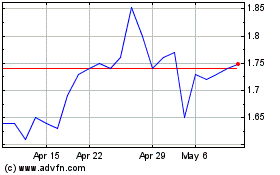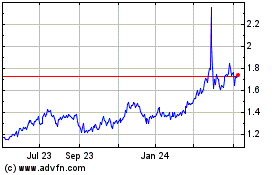2nd UPDATE: Repsol Shareholders Hit By YPF Seizure As Impact Widens
April 19 2012 - 12:23PM
Dow Jones News
Collateral damage from Argentina's seizure of oil firm YPF
spread Thursday to key Repsol shareholders Thursday, raising the
stakes for the Spanish government as it battles to protect its
interests in its former colony and dragging Mexico into the
spat.
In yet another worry for Spain's battered economy, Argentina's
move to take over Repsol's unit is hitting companies in two of the
country's already long-suffering sectors: banks and
construction.
Caixabank (CABK.MC), Spain's third-largest bank and Repsol's top
shareholder with a 13% stake, Thursday said it wouldn't writedown
the value of its stake in Repsol yet because such a move might
acknowledge that Argentina was in the right. Chairman Isidro Faine
told reporters in Barcelona that the company would be seeking a
fair price for YPF, but he acknowledged that any settlement would
be a long way off.
The bank faces an even bigger hit to its earnings, after
first-quarter net profit dropped 84% as it set aside most of its
earnings to cover potential losses on its real estate holdings in
line with new requirements set by the government.
Caixabank, along with Repsol's other two major shareholders,
Spanish construction company Sacyr-Vallehermoso SA (SYV.MC) and
Mexican state-owned oil firm Pemex, face immediate problems with
the valuations of their Repsol stakes, even if they don't make
immediate writedowns.
Caixabank currently values its Repsol shares at around EUR21.1
each, while Sacyr, the second-largest shareholder with a 10% stake,
values its Repsol shares at around EUR26, according to the
estimates of Borja Castro, an analyst with Cheuvreux. That compares
with Repsol's current share price of EUR14.66, the result of a 35%
slide so far this year amid rising YPF nationalization threats.
Argentina's government took control of YPF's operations earlier
this week, and an Argentine Senate committee approved Wednesday a
bill to re-nationalize the firm, originally a state-owned company
that was bought by Repsol in 1999. The committee approval sets the
stage for a vote next week by the full Senate on President Cristina
Kirchner's proposal to take over 51% of YPF. The plan, likely to be
passed, would leave the Argentine federal and provincial
governments in control of the company and reduce Repsol's stake to
just 6% from 57% currently.
Both Repsol and Spain's government have denounced the Argentine
takeover as illegal, and Repsol has vowed to take the dispute to
court.
The problem could be most acute for Sacyr, which has waged a
six-year long struggle to gain control of Repsol. The construction
company, like peers, took out loans in the boom years to diversify.
It has since seen revenues collapse due to the problems in Spain's
property sector and now depends heavily on Repsol's earnings and
dividends. In the first nine months of 2011, Sacyr reported sales
of just 877 homes, a fraction of the sales seen in the pre-crisis
years.
However, creditor banks can force Sacyr to add collateral to
back outstanding loans when Repsol shares drop below EUR10, said
Javier Barrio, a BPI analyst.
Sacyr is struggling to service some EUR2.5 billion worth of debt
it took on to buy the Repsol shares, and with its own shares
trading at levels last seen in 1993, it is now worth only EUR700
million, or just over a third of the value of its Repsol stake.
Sacyr declined to comment.
Sacyr's plight comes as other Spanish construction firms see
forays into the energy sector unravel. Peer Actividades de
Construccion y Servicios SA (ACS.MC) took a stake in Spanish power
utility Iberdrola SA (IBE.MC) and then tried to wrest control of
the company. However, the now cash-strapped company Wednesday sold
a 3.7% stake in Iberdrola for EUR798 million, booking a EUR540
million loss on the asset.
Mexico's Pemex, which owns 10% stake of Repsol, is seeing its
strategic bet on Spain lose value quickly as Repsol's shares slide
due to the loss of YPF, which represents just under half of
Repsol's total oil reserves.
The company declined to comment Thursday, but Mexico's Finance
Minister Jose Antonio Meade Wednesday warned during the World
Economic Forum against a "return to protectionism and the
expropriation of companies by countries."
Spain's government, meanwhile, Thursday continued a high-profile
diplomatic campaign against the move that has placed the
traditionally close ties between the two countries at their worst
level in decades. Spain's Foreign Affairs minister Jose Manuel
Garcia-Margallo called Argentina's move "an isolationist step" and
welcomed the supportive stance of the U.S. on the issue.
Sacyr shares closed Thursday down 4.4% to EUR1.62 and
CaixaBank's down 2.2% at EUR2.55. Repsol's shares were down 4.8% at
EUR14.66.
-By David Roman and Anna Perez; Dow Jones Newswires;
+34913958127; christopher.bjork@dowjones.com
(Pablo Dominguez en Barcelona contributed to this story.)
Caixabank (PK) (USOTC:CAIXY)
Historical Stock Chart
From Jun 2024 to Jul 2024

Caixabank (PK) (USOTC:CAIXY)
Historical Stock Chart
From Jul 2023 to Jul 2024
